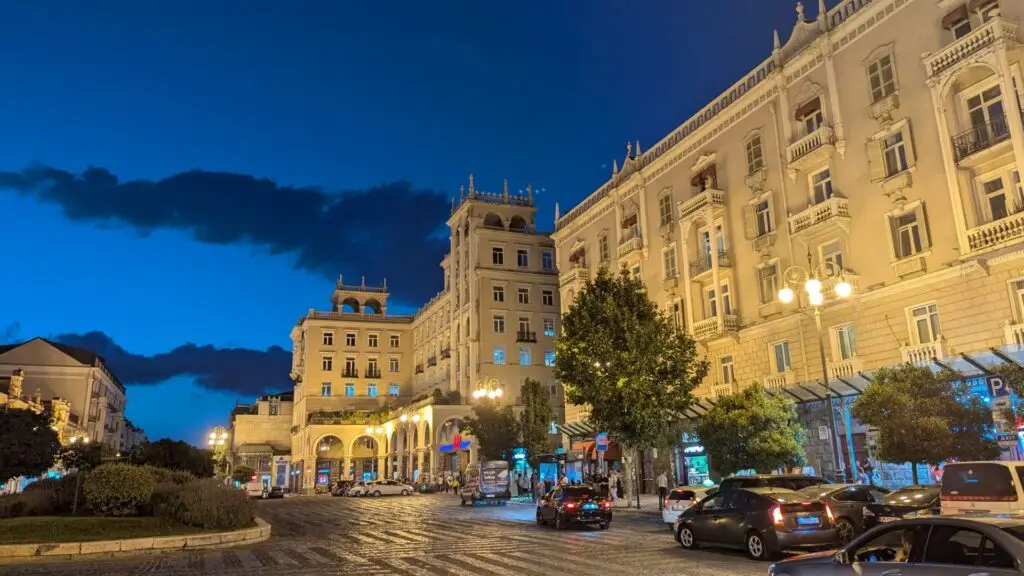What is the weather like in Tbilisi and Georgia throughout the year? When is the best weather to travel to Tbilisi? Don’t worry, the country in the Caucasus attracts visitors with moderate temperatures and has something to offer in every season. In this guide for expats and tourists, we outline everything you need to know about the weather in Tbilisi and Georgia.
The annual weather in Georgia to get you started
Whether rain, heat, snow or storm – Georgia is attractive all year round, there is something to experience whatever the weather and offers a number of climatic advantages over Europe. Georgia is a country with a total of 12 different climate zones at the interface between Europe and Asia. Here you can experience a fascinating variety of landscapes and climatic zones, which are reflected in a varied weather pattern throughout the year.
- 🌸Spring (March to May) – Spring awakens in Georgia with mild temperatures and increasing sunshine. Fruit trees and wildflowers bloom in the valleys, while snow still lies in the mountains. In Tbilisi, temperatures rise to an average of 15°C, although long-lasting rain showers can often occur.
- ☀️ Summer (June to August): Summer in Georgia is hot and dry. This mainly affects the eastern regions. In Tbilisi, temperatures can climb to over 30°C. The Black Sea coast offers a welcome cool-down with pleasant water temperatures. In the mountains, the weather is milder and ideal for hiking.
- 🍂Autumn (September to November): Autumn brings a pleasant cooling and an explosion of color to the Georgian landscape. The vineyards glow in warm shades of yellow and red, while the forests glow golden. In Tbilisi, temperatures drop to an average of 18°C and there may be occasional rain showers.
- ❄️Winter (December to February) – Winter in Georgia is characterized by cold temperatures and snowfall, especially in the mountainous regions. Tbilisi experiences average temperatures of around 5°C, with the possibility of snowstorms. The ski resorts in Gudauri and Bakuriani attract winter sports enthusiasts from all over the world.
Georgia’s weather is as varied as its landscapes and the many wine-growing regions. It ranges from really hot summers on the coast to snowy winters in the mountains. The country therefore offers the right climate for every taste. No matter what time of year you visit Georgia, you will be amazed by the beauty of nature and the charm of the country.
The annual weather in Tbilisi - a city for every season
Tbilisi, the capital of Georgia, is a true jewel in the Caucasus. The city inspires with a fascinating mix of history, culture and vibrant city life. Often the weather forecast Tbilisi works on your behalf, the climate in the city is pleasant all year round, making the city an attractive destination for any time of year.
Tbilisi is known for its temperate climate with hot summers and mild winters. The city is located in a valley, protected from extreme weather conditions. The average annual temperature is a pleasant 13.3 °C.
- ☀️ Summer (June-August): Summers in Tbilisi are warm and sunny, with average maximum temperatures of 28 °C. Perfect for exploring the old town, relaxing in the parks or visiting the botanical gardens.
- 🍂 Autumn (September-November): Autumn in Tbilisi is mild and colorful. Temperatures drop to an average of 15 °C, ideal for walks along the Kura River or a visit to the numerous museums and galleries.
- ❄️ Winter (December-February): Winters in Tbilisi are cool, but not freezing. The average minimum temperature is 2 °C. The city turns into a winter wonderland, especially beautiful at Christmas time.
- 🌸 Spring (March-May): Spring in Tbilisi is a time of awakening. Temperatures rise to an average of 18 °C, nature blossoms and the city comes to life.
- H3 More than just temperatures – Tbilisi’s special climate
- Tbilisi is not only an attractive travel destination because of its pleasant temperatures. The city benefits from its location in a valley, which results in a mild climate with little rainfall and plenty of sunshine.
- ☂️ Rainfall: With an average annual rainfall of just 495 mm and an average of 71 rainy days a year, the city is relatively dry compared to other European cities.
- ☀️ Sunshine: The weather forecast of Tbilisi gives you over 2,000 hours of sunshine a year, significantly more than many other cities in Europe.

The best time to visit Tbilisi - a feast for culture lovers
Tbilisi is worth a visit at any time of year. However, the mild spring and fall months are particularly attractive, when the weather is pleasantly warm and numerous cultural events take place.
- 🎉 May-June: Celebrate Georgia’s Independence Day on May 26 with military parades and street festivals.
- 🍇 September-October: Experience Tbilisoba, the city festival of Tbilisi, at the beginning of October with culinary delights, wine tastings and traditional music.
Georgia Tbilisi Weather: Winter is coming?
Malicious tongues claim that Tbilisi is simply awful in winter, but I disagree. From December to February, temperatures range from a high of 12 degrees Celsius during the day to a maximum of -1 degree Celsius at night. There are only rare exceptions where it gets colder. If it gets too cold, you can always use food delivery in Tbilisi and eat at home. In general, residential buildings and hotels are equipped with good heating systems. In restaurants, even the outdoor areas are heated with cheap gas from Azerbaijan. Then there are the Christmas markets staged above ground. I personally hate Christmas, but even I, as an X-Mas fanatic, find the charm of the markets cool. Instead of boring kitsch like in Europe, the Christmas markets here rely on jazz, Dean Martin and Frank Sinatra for their soundtracks – in some cases even techno music. Georgian mulled wine not only warms you up perfectly, it also tastes good.
If you don’t like being out and about in the cold, there are numerous museums, cafés and cultural events. The nightlife in Tbilisi will also warm you up, so if you’re cold, just drink chacha.
July and August in Tbilisi Weather can be very hot!
The mild winter is one thing, in summer it can get extremely hot in the Georgian capital, sometimes it doesn’t rain for weeks! It’s better to spend July and August in the mountains in Georgia, as you can really work up a sweat during the day. These two months are more suitable for Tbilisi Nightlife Enthusiasts, as it’s easier at night. If you still want to cool off in Tbilisi in summer, Turtle Lake, the Sea of Tbilisi and Lisi Lake are great places to cool off.
Our honest conclusion about the weather in Tbilisi
With the exception of the two extreme months, you can always experience a refreshing, inspiring and varied time in Tbilisi. Each season brings a different facet to the city and shines with its own advantages. Spring and fall are characterized by pleasant temperatures and cultural highlights. The mild winter shines with its Christmassy charm, mulled wine and the nearby ski resorts promise fun in the snow. The wonderful capital of Georgia offers the right experience for every taste and every season.
FAQ about the weather in Tbilisi and Georgia
Tbilisi has a temperate climate with hot summers (average 28°C) and mild winters (average 2°C). Spring and fall are pleasantly warm with temperatures around 15-18°C.
Spring (March-May) and fall (September-November) are ideal for sightseeing and outdoor activities, as the temperatures are pleasantly mild. Summer can be very hot, while winter is cool and occasionally snowy.
The weather in the mountains is cooler than in Tbilisi and varies depending on the altitude. A lot of snow falls in winter, making the mountain regions a popular destination for winter sports enthusiasts. In summer, the mountains offer a welcome respite from the heat in the lower-lying areas.
Tbilisi is relatively dry compared to other European cities. The average annual rainfall is only 495 mm and there is an average of 71 rainy days a year.
Tbilisi enjoys over 2,000 hours of sunshine a year, which is significantly more than many other European cities.
Although it can be chilly in winter, Tbilisi offers many attractions at this time of year too. Visit the Christmas markets, explore the museums and galleries, enjoy the nightlife or take a trip to the nearby ski resorts.










